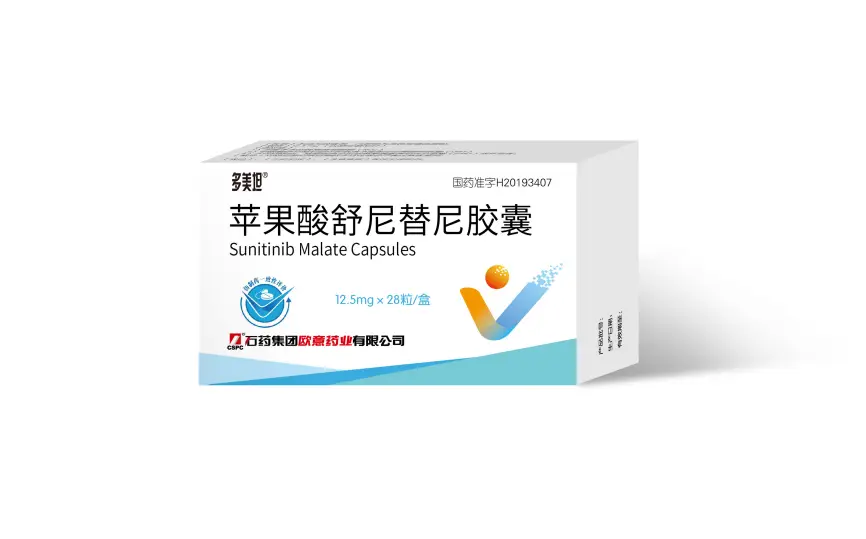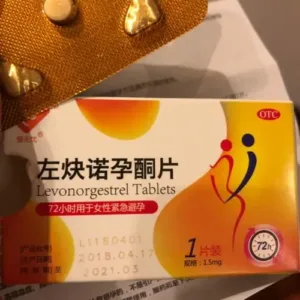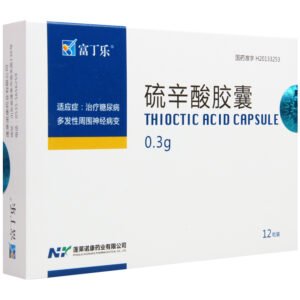Sunitinib Malate Capsules.
Functions and indications:
1. This product is used for gastrointestinal stromal tumors that have failed or are intolerant to imatinib mesylate. 2. It is used for advanced renal cell carcinoma that cannot be operated on. 3. Adult patients with unresectable, metastatic well-differentiated advanced pancreatic neuroendocrine tumors (pNET).
Usage and Dosage:
The recommended dose of this product for the treatment of gastrointestinal stromal tumors and advanced renal cell carcinoma is 50 mg, once a day, orally; take the medicine for 4 weeks and stop for 2 weeks (4/2 dosing regimen). For pancreatic neuroendocrine tumors, the recommended dose of this product is 37.5 mg, orally, once a day, continuous medication, without a withdrawal period. It can be taken with or without food. Dose adjustment safety and tolerability For gastrointestinal stromal tumors and metastatic renal cell carcinoma, the dose is gradually adjusted in 12.5 mg units according to the safety and tolerability of individual patients. The maximum daily dose does not exceed 75 mg, and the minimum dose is 25 mg. For pancreatic neuroendocrine tumors, the dose is gradually adjusted in 12.5 mg units according to the safety and tolerability of individual patients. The maximum dose used in Phase 3 clinical trials was 50 mg per day. Treatment interruption may be required based on individual patient safety and tolerability. Strong CYP3A4 inhibitors (such as ketoconazole) can increase the plasma concentration of this product. It is recommended to select drugs that have no or minimal inhibitory effect on such enzymes when used in combination. If it must be used in combination with a strong CYP3A4 inhibitor, the dose of this product should be considered to be reduced to a minimum of 37.5 mg once daily (gastrointestinal stromal tumors and renal cell carcinoma), 25 mg once daily (pancreatic neuroendocrine tumors) (see [Drug Interactions]). CYP3A4 inducers (such as rifampicin) can reduce the plasma concentration of this product. It is recommended to select drugs that have no or minimal induction effect on such enzymes when used in combination. If it must be used in combination with a CYP3A4 inducer, the dose of this product should be considered to be increased, and the maximum dose should not exceed 87.5 mg once daily (gastrointestinal stromal tumors and renal cell carcinoma), 62.5 mg once daily (pancreatic neuroendocrine tumors). If the dose of this product is increased, the patient should be carefully monitored for toxic reactions (see [Drug Interactions]).
Adverse reactions:
Because the conditions of each clinical study are different, it is inappropriate to directly compare the incidence of adverse reactions of the two drugs in different clinical studies, and the incidence of adverse reactions in clinical studies may also be different from that in clinical practice. Safety data from key clinical studies supporting the marketing of this product: The most common adverse reactions (≥20%) in patients with gastrointestinal stromal tumors (GIST), advanced renal cell carcinoma (RCC) or pancreatic neuroendocrine tumors (pNET) are fatigue, weakness, fever, diarrhea, nausea, mucositis/stomatitis, vomiting, dyspepsia, abdominal pain, constipation, hypertension, peripheral edema, rash, hand-foot syndrome, skin discoloration, dry skin, hair color changes, taste changes, headache, back pain, joint pain, extremity pain, cough, dyspnea, anorexia and bleeding. For discussions on potential serious adverse reactions: hepatotoxicity, left ventricular dysfunction, QT interval prolongation, bleeding, hypertension, thyroid dysfunction, adrenal function, see [Precautions]. Other adverse reactions that occurred in studies of gastrointestinal stromal tumors (GIST), advanced renal cell carcinoma (RCC), and pancreatic neuroendocrine tumors (pNET) are as follows. The following data are from 660 patients, including 202 patients in a double-blind, placebo-controlled study of gastrointestinal stromal tumors (GIST) (see [Clinical Studies]), 375 patients in an active-controlled study of advanced renal cell carcinoma (RCC) (see [Clinical Studies]), and 83 patients in a placebo-controlled study of pancreatic neuroendocrine tumors (pNET) (see [Clinical Studies]). The safety of sunitinib was evaluated in the GIST Study 1, a randomized, double-blind, placebo-controlled trial in which patients who had previously received GIST treatment received sunitinib 50 mg (n=202) or placebo (n=102) daily on a 4/2 dosing schedule. The median duration of treatment in the double-blind study was 2 cycles (mean 3.0 cycles, range 1-9 cycles) in the sunitinib group and 1 cycle (mean 1.8 cycles, range 1-6 cycles) in the placebo group as of the interim analysis. Dose reduction occurred in 23 patients (11%) in the sunitinib group and no patients in the placebo group. Treatment interruption occurred in 59 patients (29%) in the sunitinib group and 31 patients (30%) in the placebo group; 7% and 6% of patients, respectively, permanently discontinued the drug due to treatment-related non-fatal adverse reactions. For specific adverse reactions, please refer to the drug instructions.
Contraindications:
This drug is contraindicated in patients with severe allergies to this product or its inactive ingredients.
Share:
Products
Our offers
Health Classification
Let us work together to protect precious health



























